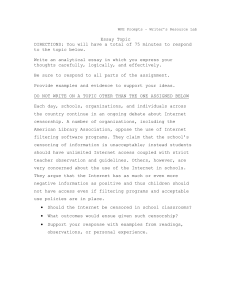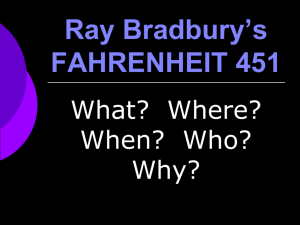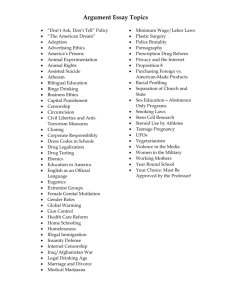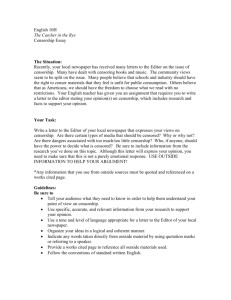How Censorship Changes The Way We Watch Television
advertisement
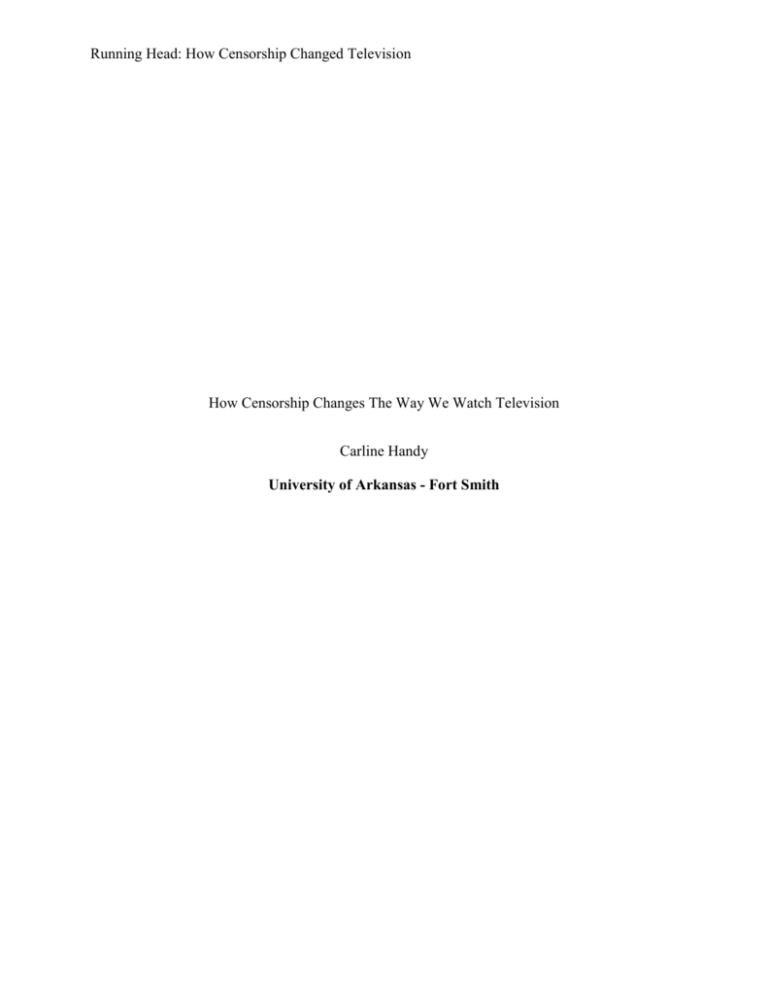
Running Head: How Censorship Changed Television How Censorship Changes The Way We Watch Television Carline Handy University of Arkansas - Fort Smith 1 This paper will be discussing the history of television censorship and how it has affected broadcasting programs over the years in the United States. How censorship changed the way we not only look at television for our kids but how it can also affect adults and an entire government to want to take demand of how we watch TV. What is TV censorship? In my opinion, TV censorship is when adults can view what children are watching on their television screen in the comfort of their own home. Censoring certain television stations can be very helpful for families all over whether the reason is a personal choice or religious. Either way it works out for every party involved it puts them in demand. On the opposite side of that not censoring the way you and your kids watch television can be brutal and harmful not only to themselves but to others as well. TV has several violent networks. Kids can easily stumble on to a bad network and they end up watching something that gives them nightmares or something that is just plain wrong. There are several different networks out there that can be easily mistaken based on the shows they air at night compared to the one’s they decide to air in the day time. For example, CBS and NBC are networks for adults during the late nights but during day time television you get talk shows like Good Morning America and several different soap operas which some would argue are okay for kids to tune into. PBS on the other hand would be a well-known television station for kids. However, networks have changed over the decades. For instance, cartoon network use to be a family friendly show that broadcasted cartoons like Scooby Doo and Power Puff Girls now in today’s generation you get inappropriate cartoons throughout the day. It has changed so much that if you watch it after 10pm it is no longer called Cartoon Network it is called Adult Swim. Although there are cartoons with kids in them they are very much filled with profanity and pure disrespect. 2 Another question one might ask is what is the difference between TV censoring and Film censoring? The difference is in TV censoring you never know what to expect or what you are going to get from a particular show. With film we are informed what type of movie we are about to see and if it is appropriate for kids of a certain age bracket. In censoring movies the producers and production team lets you know a head of time if the film will be Rated PG, PG13, Rated R, etc. Another effect of not censoring your television is that it could affect your child’s behavior. Children often like to act out violent scenes they see on television. In the end kids should only watch shows that are appropriate for their age. The age of television is not the same today as it was decades ago. Our information environment is completely different. According to Postman “We have no way of protecting ourselves from information disseminated by corporate America.” (Postman, 140) television now controls the flow of public engagements in America. In the years before our time censorship was such a big deal because our generation focused so much time on religion that we were afraid to offend anyone. Of course, humans know best on how to tell someone how to live their own life and what should or should not be allowed on their television screen. Censorship has always and will always play a big part on how we watch TV. Again Postman was very clear on his view of censorship and how it should be looked at and portrayed. He also acknowledged that “censorship is the tribute tyrants pay to the assumption that a public knows the difference between serious discourse and entertainment.” (Postman, 141) not everything you see on your television screen is true. But also it is up to you and your own mind to decide what it is you want to believe. Are we as Americans smart enough to know that entertainers are there to do what they are paid to do and that is entertained without anyone getting upset about what they are watching. The television screen is more than a light source. 3 Throughout television history every historical character had a flaw they were hiding weather that be animated or jus plan fiction. For instance, in 1952 Ball's pregnancy during an entire season of "I Love Lucy," the actual word "pregnant" wasn’t allowed on air. Instead, the show uses phrases that seem equally informative but less fraught with sin, such as "with child," "having a baby," and "expecting." Again, religion played a huge part in many households during this time. In a study among college and high school students, found attitudes towards censorship were significantly correlated with authoritarianism, conservatism, traditional family ideology, and religiosity. Not only was television strict to woman but men weren’t let off easy either and in 1956 the king of pop was no exception Elvis' first appearance on "The Ed Sullivan Show" is seen by 60 million people but his hips, however, aren't so lucky. After his cover of Little Richard's "Ready Teddy" -- complete with trademark gyrations -- the camera switches to a close-up of his face as not to over-stimulate the American public. By the time he appears on the show for the third time (in January 1957), he's only shown from the waist up. (CNN.com) Elvis may have been a fan favorite but the networks did their homework and made sure they had the right camera men on duty to crop out his private area and more. His performance was to over the top for his generation of fans he wanted to inspire. By the time we got to the 1960’s and beyond things started to light up a little and we started to see more skin as it progressed. In 1964-1966 Mary Ann from "Gilligan's Island," Jeannie from "I Dream of Jeannie and "Gidget" are all barred from baring their navels. It’s a tough year for network censors struggling to keep up with the hippie culture's profusion of skin and wanting to break barriers. 4 In 1967-1969 Tommy and Dick Smothers challenged the censoring of their show with CBS and the political parties who tried to ban the way they were talking on live television. Because of their fight to not want to obey by the rules of the production team the Smothers Brothers lost their show. According to a journal by Dr. David S. Silverman +-Tom Smothers said during a rebroadcast of the February 26, 1967 episode “There was no censorship in the first four weeks of the show” (E!, 1992) (Silverman, 6) Censorship may have been a huge deal to the broadcasting companies but to the entertainers they wanted to give the world something real and uncut. That has never been done before. Right then and was just was not the time for it. “The Brothers became keenly aware that no one on television spoke to the growing youth counter-culture movement that was building in the United States, and they began to tailor segments of the program to address gun control, censorship, the draft, and Vietnam on a weekly basis.” (Silverman, 6) Despite trying to show some awareness the brothers were still unsuccessful because no one at the time was ready to take that big a gamble. The concern for most household viewers was that they were already comfortable with a certain life style that they were not ready for a change. In 1977, Richard Pryor was one of the first among many African Americans to have his own television show. This was refreshing for the Black community because not many people came out on television that they could relate to. They had a voice for their skin tone. The “black” community got someone who was loud, out-spoken and uncensored. The Richard Pryor Show was perceived to be the third-place network’s best chance for a hit program that fall for NBC. To help keep the show alive Richard hired a soon to be well known actor Robin Williams who was there to even out the show and bring more viewers. But the show was later cancelled after only four episodes. After the cancellation of the show Pryor went on national television to share 5 his thought on television and censorship with NBC “TV is like those children’s dolls, there are no private parts.” (Silverman, 8) the show was later replaced by a show called Happy Days. In 1994 and 1995 NBC and Fox were both in a rabbit whole looking for something new to bring to television. Both networks ran several segments that the other network would not run to see who would get the most viewers. Desperate for an audience NBC aired a show entitled “Small Condoms” viewers found the segment to be shocking and confusing. It was to never be seen again after only two shows. Censorship has proven to be an ambiguous concept ranging from explicit legal prohibitions to more subtle forms of economic and social control. According to Ronald J. Faber “Censors have defended their actions as allegedly protecting our souls from blasphemy, or society from alien political, social, or economic ideas.” (Faber, 167) it had definitely try to stay on the minds of politics and the economy but socially no one was that involved because the internet nor social media was to demanding of our time. Censorship is, and has been, a widely discussed phenomenon, but research on factors contributing to the procensorship attitudes has been rather limited because no one wants to dig that deep into the situation. If it works some may leave it and let it air. If it fails or producers do not want it to show on their network then it will be completely dropped. There are more attempts at censorship now, than ever before.' There are more than forty states who are nationally known for speaking out on the dangers of censorship and that is concerned about all the educational materials used in the schools. They feel that television will soon takeover and kids will no longer want to read a book or do math homework because they will be glued to the TV having everything being fed to them. In 2004, pop superstar Janet Jackson performed on the half time show during Super Bowl XXXVIII. While performing alongside Justin Timberlake Janet had a wardrobe malfunction that 6 set not only ratings but people through the roof. While performing Justin accidentally grabbed Janet’s corset the wrong way and her boob popped out. While this was a totally accident it still left viewers in shock and caused a frenzy all over the world. Because the show was live there was no censoring the performance. Although Janet and Justin rehearsed for hours to make sure the performance was a showstopper they broke records in the opposite way of what they trying to attempt. CBS was fined 550,000 by FCC and soon went on to sue Janet for the mishap and all the money they had to give up because of her performance. CBS and Janet Jackson weren’t the only ones that had to come out of their pockets for this controversial mishap. The NFL had to pay $10 million in sponsor refunds. After the performance CBS vowel to only broadcast shows that has went through a pilot first and not live. There were 500,000 American complaints to network to the network. Ironically, Janet was never invited by to show on the network by neither CBS nor the NFL. There are several Pros and Cons to adding censorship to what you watch on television. For instance, a pro would be: Censorship is the best way to protect the youthful generation from harmful information. It stops them from seeing inappropriate material like the Janet Jackson nip slip. Another pro would be: Censorship can keep a nation composed during times of stress. For example, the George Zimmerman v. Trayvon Martin case. Had the media not put the case on television our nation would not be so disappointed in our judicial system. Instead, it just has them confused and lost without faith. Especially the African American community who fought so hard to get justice for a teenage boy walking home from the store with a bag of skittles. The government censors anything they consider harmful to national security not to a culture or a community trying to get treated fairly. With those pros comes cons. Some important cons to censorship could be: Censorship is against the basic human rights. Again, which brings me back to the trial case above. Censoring what was being said in the court room 7 was not something that we were trying to do because as sad of a case that it was some may have viewed it as entertainment. Another con would be: If censorship is passed in America the people will react with violence. Most people will be angered at their freedom of speech right being taken from them. But who is to say that this hasn’t already happen? Is it just not publically noticed or are we just blind to the situation. As we speak the internet is slowly being turned into a safety zone like the users are uneducated. We rely so much on what we see on television and the web that we don’t think for ourselves anymore and we are to freely to believe whatever is being thrown at us. For example, so many of our youth are compelled with Facebook, instagram, and twitter that they do not notice the damage they are causing to themselves and all the work those companies go through to protect themselves. The companies have already perfected their techniques of censoring. 8 References Hernando Rojas, D. V. (1996). For The Good Of Others: Censorship And The Third-Person Effect. International Journal of Public Opinion Research, 6-8. Lendler, I. (2007, 07 31). A timeline of TV censorship. Retrieved 03 march 6, 2014, 2014, from CNN: http://www.cnn.com/2007/LIVING/wayoflife/07/31/censorship/ Postman, N. (1985). Amusing Ourselves to Death: Public Discourse in the Age of Show Business. New York: The Penguin Group. Silverman, D. S. (2008). "You Can't Air That: Four Cases of Controversy and Censorship in American Television Programming.". The Journal of Popular Culture, 6-8.

